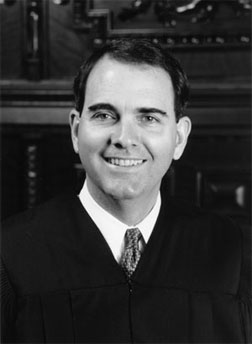
March 25   10:00 a.m.  Â
Courtroom 1, 3rd FloorÂ
James R. Browning US CourthouseÂ
United States Court of Appeals - 9th CircuitÂ
95 Seventh St, San Francisco
Â
05-50170 United States v. Aguila-Montes De OcaÂ
"Torture Judge" Should be Impeached and Prosecuted see also Quid Pro Quo
Giving the Green Light
The recently released Justice Department Office of Professional Responsibility Report unwaveringly supports the conclusion that Bybee failed to provide a thorough, objective, and candid legal analysis of the law to his client, the Bush administration. Bybee signed off on the August 1, 2002 Memo written by John Yoo, a current professor of constitutional law at Berkeley Law. In this particular memo, Bybee upheld waterboarding and sleep deprivation, among other torture techniques, despite the fact that they constitute long-lasting harm and the imminent threat of death. Bybee failed to further investigate apparent problems in the legal analysis that he was aware of himself or that were brought to his attention. He acted in "reckless disregard of his professional obligations" such that he "should have recognized and questioned the unprecedented nature of the Bybee Memo's conclusion that acts of outright torture could not be prosecuted under certain circumstances..." (OPR Report, Pages 256-7)
No Exoneration
While the OPR Report held that both Bybee and Yoo engaged in professional misconduct, this conclusion was overruled by David Margolis, a high-level Department of Justice attorney. In a memo to Attorney General Eric Holder, Margolis argues that he did not find the OPR's definition of misconduct persuasive and blocks the OPR from referring the matter to state bar disciplinary authorities where Yoo and Bybee are now licensed. However, Margolis fails to exonerate Bybee, as the report acknowledges that Bybee's signature "added greater authority to the memoranda" and "carried with it a significant degree of personal responsibility." (Page 255) However, unlike the report's conclusion on John Yoo, the report cites "insufficient evidence to conclude that Bybee knew at the time that the advice in question was incomplete or one sided." (p. 256) The only statement that Bybee has made concerning the Memos is that "certain sections could have been more thorough." (Footnote 210, Page 256) The report underscores that Bybee's actions went beyond reviewing several drafts of the torture memos; he knowingly and willfully subverted the law. His actions were "objectively unreasonable under the circumstances." (Page 257)
Torture's Rewards
The report reveals that Bybee "was so personally involved, he was kind of taking over," "churn[ing] through three drafts with comments on them per day." (Page 255) Bybee's signature not only authorized a program of CIA interrogation in knowing violation of the Geneva Conventions, the Convention Against Torture, the War Crimes Act, and the domestic torture statute, but also endorsed a legal analysis that justified acts of torture under certain circumstances. Bybee, for instance, failed to question the application of the medical benefits statutes to the torture statute in authorizing the following: "even if the defendant knows that severe pain will result from his actions, if causing such harm is not his objective, he lacks the requisite specific intent even though the defendant did not act in good faith." (Page 257) Bybee went further in shielding himself and others from prosecution under the torture statute, framing these prosecutions as "unconstitutional infringements on the President's war powers." (Page 255) In exchange for controlling the production of these memos and ensuring that they were given the force of law, Bybee was given his current position on the federal bench.

